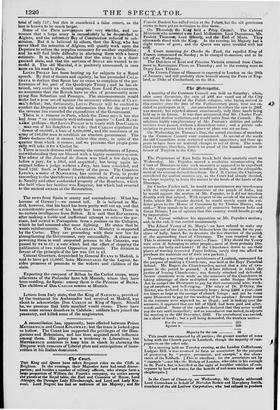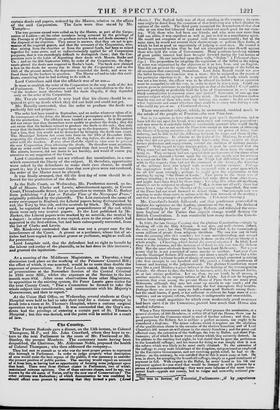In the Court of Chance Ty, on Wednesday, Mr. Temple
addressed Lord Cottenham in behalf of Nicholas Sankie and Humphrey Smith, members of the old Ludlow Corporation, who had refused to product certain deeds and papers, ordered by the Master, relative to the affairs of the said Corporation. The facts were thus stated by Mr. Temple— The two persons named were called on by the Master, as part of the Corpo- ration of Ludlow—all the other members being screened by the privilege of
the Peerage or of Parliament—to produce certain books and deeds necessary for
the disposal of the charities. They swear in answer, that they are not in pos- session of the required papers, and that the revenues of the Corporation, whe- ther arising from the charities or from the general funds, had been so mixed together for some years, and so indiscriminately applied for all Corporation purposes, that it was exceedingly difficult to distinguish them; that the Cor- poration were in the habit of depositing their deeds with Merars. Rocke and Co. ; and on the 23d September ItV35, by order of the Corporation, the depo- nents placed the deeds now required in Rocke's bank. The bank now claimed a lien on the deeds for money due to them by the Corporation ; and on the 18th of the present month, the deponents demanded the deeds, and were re- fused them by the bankers in question. The Master refired to take this certi. icate, conceiving that he bad nothing to do with it.
Lord Cottenham said that the affidavit was of no use— It went to establish the order of the Corporation in the very teeth of the'Act of Parliament. The Corporation could not act in contradiction to the Act ; and the bankers must therefore hold the deeds illegally, if they depended
erely on the order of the Corporation.
Mr. Ten pie considered it very hard that his clients should be re- quired to give up deeds which they did not hold and could not get. Mr. Romilly contended, that the order to produce the deeds was perfectly fair and proper— The order had been issued in September, and no notice whatever taken of it. In consequence of the delay, the Master issued a peremptory order in November for the production. The affidavit was handed in as answer. In it the parties did not swear that they themselves were unable to produce the deeds; they did not swear that the bankers refused to produce the deeds in the suit ; they only swear that the bankers refused to give them up to the deponents. If the bankers had a lien, that lien would not be disturbed by bringing the deeds into court. The Municipal Reform Act came into force on the 24th of December 1835, respecting the charities; and on the 23d, the day before, the deeds were depo- sited with the bankers. It was clear that the object in view was to pre,ent the new Corporation from obtaining the deeds. Ile therefore must maintain, that no order could have been more required than that issued by the Master. His clients, however, did not desire to act harshly, and would of course pay attention to any suggestion of the Court.
Lord Cottenham would not act without due examination, in a case which concerned the liberty of the subject. If, therefore, opportunity were asked by the defendants to make their case clearer, he would grant it; but if a better account than that now given were not rendered, the order of the Master must be obeyed.
It was finally arranged, that till the first day of term should be al- lowed for the production of the deeds.
In the Rolls Court, on Wednesday, Mr. Pemberton moved, on be- half of Messrs. Clarke and Lewis, advertisement-agents, in Crown Court, Threadneedle Street, for an injunction to restrain Mr. C. Barker from publishing "A List or Tabular View of the Newspaper Press," originally published by the plaintiffs. The List contained the name of every newspaper in England, the Liberal papers being distinguished by red, the Tory by blue ink, and the neutrals by black. Mr. Pemberton said, he regretted to find a very great preponderance of the red, while there were only two neutral papers. In the List published by Mr. Barker, the Liberal papers were marked by an asterisk, the neutral by a dagger: in other respects it was copied, even to the errors which had appeared in the first edition, but had been subsequently corrected, from the list of Clarke and Lewis.
Mr. Kindersley contended that this was not a proper case for the interference of the 'Court. A grocer or a perfumer, whose list of ar- ticles had been copied by another grocer or perfumer, might as well ask for protection.
Lord Langdale said, that the defendant had no right to benefit by the labour and outlay of the plaintiffs, as he had done in this instance ; and granted the injunction..



























 Previous page
Previous page